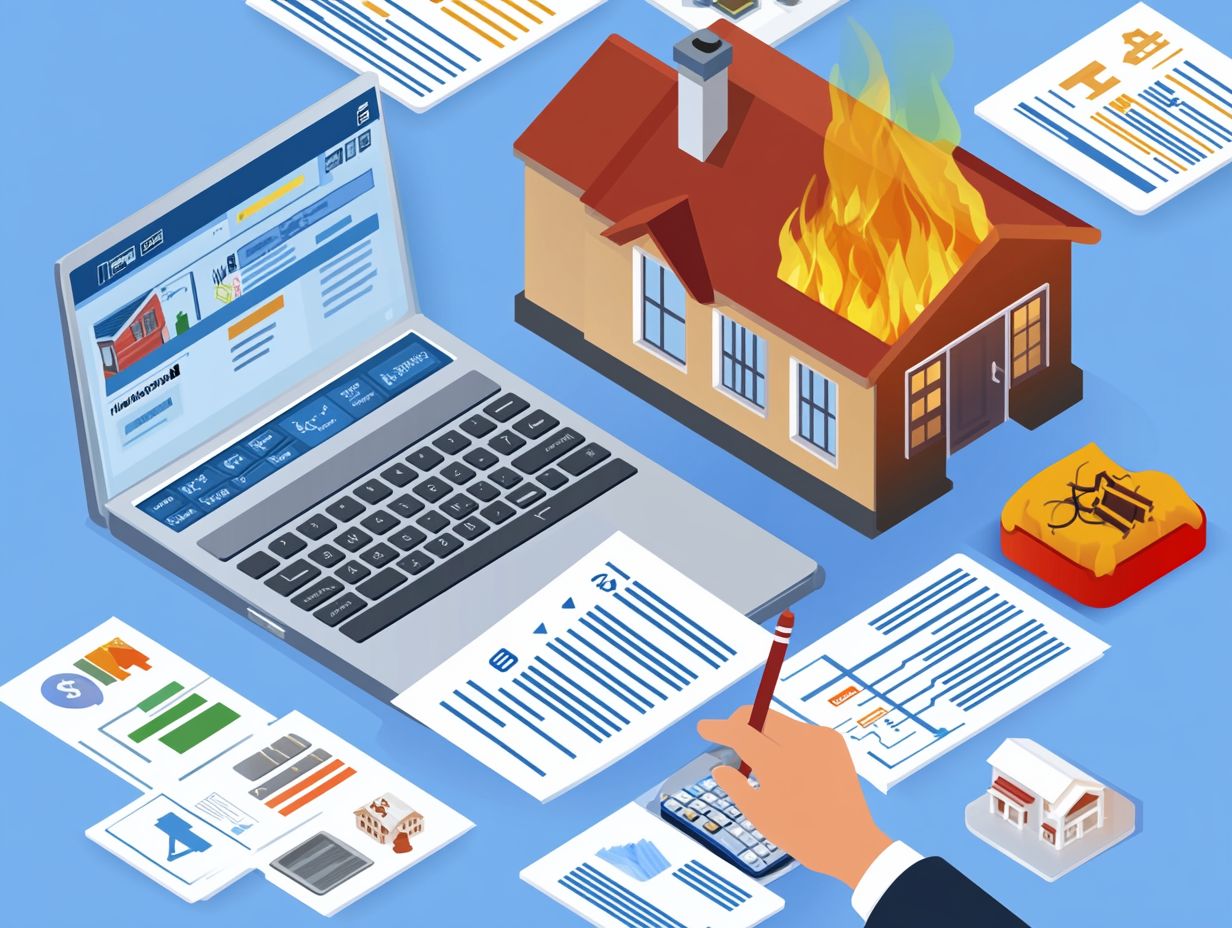7 Factors That Affect Your Home Insurance Premium
Understanding your home insurance premium can feel like navigating a maze. Grasping the key factors that influence it can help you save money and ensure you have the right coverage.
Consider everything from the location and age of your home to your credit score and claims history. Each of these elements plays a significant role in shaping what you pay.
This article delves into seven essential factors that impact your home insurance premium. You ll find insights into coverage types, available discounts, and savvy tips for reducing costs.
Dive in to gain a clearer picture of how to safeguard your investment while keeping your expenses in check.
Contents
- Key Takeaways:
- 1. Location of Your Home
- 2. Age and Condition of Your Home
- 3. Type of Coverage
- 4. Your Credit Score
- 5. Previous Claims History
- 6. Presence of High-Risk Features
- 7. Insurance Company and Discounts
- What Are the Different Types of Home Insurance Coverage?
- Frequently Asked Questions
- What Are the 7 Factors That Can Affect My Home Insurance Premium?
- How Does the Location of My Home Affect My Insurance Premium?
- Does the Age and Condition of My Home Impact My Insurance Premium?
- How Do Coverage Limits and Deductibles Affect My Insurance Premium?
- Can My Credit Score Affect My Home Insurance Premium?
- Will My Prior Claims History Impact My Insurance Premium?
- Does the Type of Policy I Choose Affect My Insurance Premium?
Key Takeaways:

- The location of your home impacts your insurance premium.
- A good credit score and a clean claims history can help lower your premium.
- The type of coverage, along with your home s age and condition, affects your premium.
1. Location of Your Home
The location of your home is important in shaping your homeowners insurance rates. To ensure you get the best coverage, be aware of the mistakes to avoid when buying home insurance, as various location factors can significantly influence both the average cost and the type of coverage necessary to protect your property.
Insurance companies assess the disaster risks unique to specific regions. For instance, they consider fire protection and flood insurance requirements, which in turn affects premium costs.
Take Oklahoma as an example. Homes there face unique risks from tornadoes. Insurers provide specific coverage options tailored for such natural disasters.
Conversely, California s proximity to fault lines and its susceptibility to wildfires result in distinct insurance needs. This often leads to higher premiums due to these increased risk factors.
In urban environments with elevated crime rates, homeowner insurance costs may be steeper compared to rural areas. These geographical and socio-economic dynamics highlight the importance of staying informed about your local market. This knowledge helps secure the most suitable and cost-effective coverage for your home.
2. Age and Condition of Your Home
The age and condition of your home are critical elements that insurance companies evaluate. Understanding what factors affect home insurance premiums can help you understand how these factors play a role in determining risk assessments and setting homeowners insurance premium costs for your property.
As homes age, their structural integrity often diminishes. This makes them more vulnerable to damage from weather and wear, potentially leading to increased insurance premiums.
Insurance providers are also paying greater attention to the materials used in construction. Modern building techniques and materials, such as fire-resistant siding and impact-resistant roofing, are viewed as lower risk. This trend encourages homeowners to invest in updating their properties, enhancing safety while positively affecting insurance coverage.
An accurate home valuation is essential for establishing appropriate insurance limits. This ensures that your coverage reflects the current market value and specific risks tied to an aging structure.
3. Type of Coverage
Choosing the right type of home insurance coverage is essential for you as a homeowner. It directly impacts the protection of your dwelling and personal property against unforeseen disasters.
A solid understanding of the various options available is crucial. For instance, dwelling coverage typically safeguards the physical structure of your home, ensuring that the walls, roof, and other integral components are well-protected.
On the other hand, personal property protection is designed to cover your belongings within the home, such as furniture and electronics, should they be damaged or stolen.
It’s also important to be aware of coverage limits, as these dictate the maximum amount your policy will pay for certain claims. This knowledge is key to aligning your policy with your specific insurance needs, ensuring that both your home and its contents are comprehensively covered.
Take a moment to review your insurance policy today! Protect your home and save money.
4. Your Credit Score
Your credit score holds significant influence over your homeowners insurance premium. Many insurance companies use credit-based scoring to assess risk and determine rates.
If your credit score is low, you may face higher premiums, as insurers see you as a higher-risk client. In contrast, maintaining a strong credit rating likely leads to better rates and a lighter financial load.
You can boost your credit score by doing the following:
- Ensuring timely bill payments
- Reducing credit card balances
- Reviewing credit reports for inaccuracies
A strong credit history helps you borrow more and saves money on insurance.
5. Previous Claims History

Your past claims history is crucial for determining your insurance rates. Insurers closely examine the frequency and nature of your past claims.
A history with multiple claims may indicate a higher risk profile. Each claim raises red flags and can increase your premiums, reflecting the heightened chance of future claims.
You must prioritize maintaining a clean claims history. This proactive approach can lead to better insurance terms and lower costs.
Consider minimizing claims or even self-insuring when possible to lower your costs.
6. Presence of High-Risk Features
High-risk features in a home can significantly impact your homeowners insurance, often resulting in higher premiums and the need for more comprehensive coverage. It’s wise to consider questions to ask before buying home insurance to make informed decisions.
Features like swimming pools or old electrical systems can increase risks, prompting insurers to raise deductibles to offset potential losses. For instance, a swimming pool increases the likelihood of accidents and requires additional safety measures for compliance.
Take action to reduce these risks. Updating your electrical systems enhances safety and lowers fire hazards. Investing in proper pool barriers can even earn you discounts.
By addressing these vulnerabilities, you could potentially lower your insurance costs and gain peace of mind.
7. Insurance Company and Discounts
Your choice of insurance company can greatly affect your rates. Different providers offer various discounts and incentives that can reduce your overall premium costs.
Get multiple quotes to find the best policy for you. Investing time in comparing rates from different companies can yield significant savings.
You might discover a variety of available discounts, such as:
- Bundling policies
- Installing security systems
- Maintaining a claims-free record for a certain period
Companies like Kin Insurance often provide unique perks for tech-savvy homeowners or those in specific areas. By dedicating time to research and comparison, you can make informed decisions and achieve substantial reductions in your premiums.
What Are the Different Types of Home Insurance Coverage?
Understanding the various types of home insurance coverage is vital for you as a homeowner. This ensures that your personal property, dwelling, and liability are adequately protected against a range of risks.
With numerous policies available, navigating these options with care is crucial. For example, dwelling coverage safeguards the physical structure of your home from disasters like fires and storms.
Meanwhile, personal property protection secures your belongings, guaranteeing they can be replaced in the event of theft or damage.
Liability coverage offers financial protection should someone get injured on your property.
If you live in a flood-prone area, flood insurance becomes essential. Standard homeowners policies often leave such damages uncovered. Assess your unique needs and consider consulting an insurance agent to find the perfect blend of coverage types tailored specifically to your situation.
What Are the Most Common Home Insurance Discounts?
As a homeowner, you have the opportunity to tap into various home insurance discounts. These can translate into substantial savings on your premium costs, making comprehensive coverage more accessible.
Familiarize yourself with different options available like discounts for having security systems, smoke detectors, or updated plumbing and electrical systems. This can optimize your savings.
Bundling your home insurance with other policies, like auto insurance, often leads to lower overall rates. Maintaining a clean claims history meaning no claims filed in recent years can significantly boost your eligibility for these discounts.
To fully capitalize on these opportunities, don t miss out! Connect with your insurance agent today. Inquire about specific discounts and the steps to apply for them, ensuring you make the most of every potential saving available to you. Act now to start saving!
How Can You Lower Your Home Insurance Premium?

Lowering your home insurance premium is entirely achievable with a few strategic moves. Incorporating safety features and making home improvements can effectively reduce risk factors.
Start by installing smoke detectors, security systems, and deadbolts; these enhancements significantly decrease the chances of theft and fire damage.
Elevating your home security with additions like motion-activated lights and surveillance cameras can also yield substantial savings. Connect with your insurance provider to inquire about any available discounts.
Many insurance companies reward policyholders for making upgrades and taking initiatives that showcase a commitment to safety. By taking these proactive steps, you not only safeguard your home but also enjoy the financial benefits reflected in your insurance costs.
What Factors Do Not Affect Your Home Insurance Premium?
While numerous factors play a role in determining home insurance premiums, understanding key facts about home insurance coverage gives you the power to make informed financial decisions when managing your coverage.
Your marital status or occupation typically has little effect on what you pay. Instead, concentrate on elements that truly matter, such as your home’s location, its age, and the security features you have in place.
The materials used in construction and the number of times you’ve made claims can significantly influence your premiums. By identifying which factors are influential and which are not, you can tailor your policy to better fit your unique situation and potentially trim unnecessary costs.
How Can You Determine the Right Coverage for Your Home?
Determining the right coverage for your home requires a meticulous assessment of your property. This includes home valuation, coverage limits, and a thoughtful consultation with insurance agents for personalized advice.
Start this process by conducting a detailed inventory of your belongings to fully grasp the total value of your possessions. It s essential to familiarize yourself with the different types of coverage available, such as dwelling, personal property, and liability protection.
Engaging with knowledgeable insurance agents can provide you with invaluable insights; these professionals often help identify gaps in coverage that might not be immediately apparent.
Additionally, assessing unique risk factors related to your location like susceptibility to natural disasters or prevailing crime rates can significantly influence the type and amount of insurance you ll need. This diligence ensures you secure optimal protection for your home.
Start your insurance journey today and ensure your home is well protected!
What Are the Consequences of Not Having Home Insurance?
Not having home insurance can lead to serious consequences. You may face significant financial burdens if your property suffers damage or loss, along with potential legal complications.
Without coverage, you might find yourself unable to afford costly repairs after unexpected disasters. This situation could quickly deplete your savings or even lead you into debt.
Many mortgage lenders require insurance as part of the loan agreement. Skipping home insurance can jeopardize your ability to keep your home in good standing.
A history of being uninsured can negatively impact your future homeowners insurance rates. This often results in higher premiums, as insurers may categorize you as a higher-risk client.
Without home insurance, you could find yourself in a tricky situation that s hard to escape! It s essential to weigh the far-reaching implications of this decision carefully.
Frequently Asked Questions
What Are the 7 Factors That Can Affect My Home Insurance Premium?

- Location
- Age and condition of your home
- Coverage limits
- Deductibles (the amount you pay out of pocket before insurance kicks in)
- Credit score
- Prior claims history
- The type of policy you choose
How Does the Location of My Home Affect My Insurance Premium?
The location of your home plays a crucial role in determining your insurance premium. Homes in areas prone to natural disasters, crime, or high property values tend to have higher premiums compared to those in safer or more affordable areas. Additionally, understanding the impact of claims on your home insurance premium can further influence your coverage choices.
Does the Age and Condition of My Home Impact My Insurance Premium?
Yes, the age and condition of your home can impact your insurance premium. Older homes may have outdated systems or materials that pose a higher risk for claims. In contrast, newer homes with modern features may be less expensive to insure.
How Do Coverage Limits and Deductibles Affect My Insurance Premium?
The higher your coverage limits and deductibles, the higher your insurance premium will be. This is because higher coverage and deductibles mean the insurance company will have to pay more in the event of a claim.
Can My Credit Score Affect My Home Insurance Premium?
Yes, your credit score can affect your home insurance premium. Insurers use credit scores to determine your level of risk as a policyholder. A lower credit score may result in a higher premium, while a higher score can lead to a lower premium.
Will My Prior Claims History Impact My Insurance Premium?
Yes, your prior claims history can impact your insurance premium. If you have a history of making frequent claims, insurance companies may consider you a higher risk and charge a higher premium.
Does the Type of Policy I Choose Affect My Insurance Premium?
Yes, the type of policy you choose can affect your insurance premium. For example, choosing a comprehensive policy with more coverage will likely result in a higher premium than a basic policy with limited coverage.
Protect your home today to avoid future heartbreak! Consider getting home insurance to safeguard your investment.




